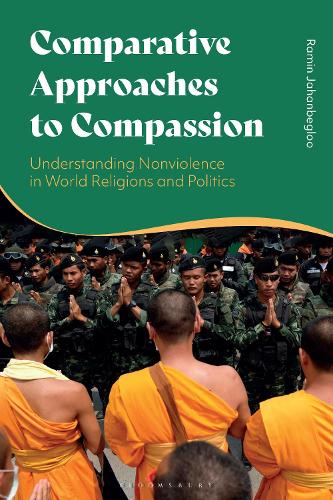
Comparative Approaches to Compassion: Understanding Nonviolence in World Religions and Politics
(Paperback)
Available Formats
Publishing Details
Comparative Approaches to Compassion: Understanding Nonviolence in World Religions and Politics
By (Author) Professor Ramin Jahanbegloo
Bloomsbury Publishing PLC
Bloomsbury Academic
25th January 2024
United Kingdom
Classifications
Professional and Scholarly
Non Fiction
Hinduism
Buddhism
Comparative religion
Jainism
201.72
Physical Properties
Paperback
176
Width 138mm, Height 216mm
Description
Ramin Jahanbegloo develops the concept of compassion as a practical and ethical response to the problems of todays world. Examining the power of compassion through the lens of multiple world religions, he explores ahimsa in Buddhism, Jainism and Hinduism and neighbourly love in Christianity, before synthesizing the two concepts in the Gandhian theory of non-violence and its impact on Muslim and Christian thinkers such as Abdul Ghaffar Khan and Martin Luther King, Jr. Jahanbegloo considers the idea of a compassionate civilization based on the nonviolent democratic theory put forward by Gandhi with Swaraj, and completed by Martin Luther King, Jr. with the Beloved Community. By scrutinizing compassion in various religious and ethical traditions and exploring the relevance of homo fragilis, Jahanbegloos comparative approach enriches our understanding of nonviolence as a universal philosophy and practice for the 21st century. He shows that nonviolence is not only a mode of thinking and a way of life, but also a powerful strategy of social and political transformation.
Reviews
Ramin Jahanbegloo has written with heart a beautiful understanding of the ethical knowledge that makes us human and at the same time divine. If you want a richer journey in wisdom, you must read this book, a work offering the foundations of a human being, Homo Fragilis, in search of understanding and love for others. * Mario I. Aguilar, Director of the Centre for the Study of Religion and Politics, University of St. Andrews, UK *
Comparative Approaches to Compassion expands our understanding of non-violence by analyzing the thoughts of some contemporary leaders in addition to perspectives from the past. These additions incorporate the love inherent to that which is humane, the Otherness of the Other, and above all, compassion. These historical contexts further enrich the concept. * Romila Thapar, Professor Emerita of History, Jawaharlal Nehru University, India *
In his perceptive and nuanced study Jahanbegloo shows convincingly how concepts initially rooted in various religious traditions can be applied in addressing contemporary problems challenging modern societies. His comprehensive account will be extremely helpful to many seeking guidance in our perplexing times. * Shlomo Avineri, Professor of Political Science, Hebrew University of Jerusalem, Israel *
Author Bio
Ramin Jahanbegloo is Professor and Vice Dean at Jindal Global Law School, India, and Director of the Mahatma Gandhi Centre on Nonviolence and Peace Studies at O.P. Jindal Global University, India.
